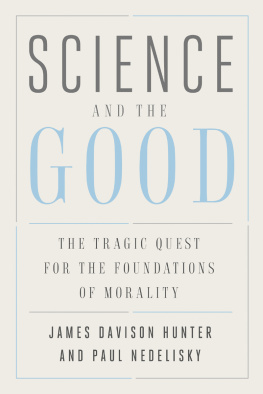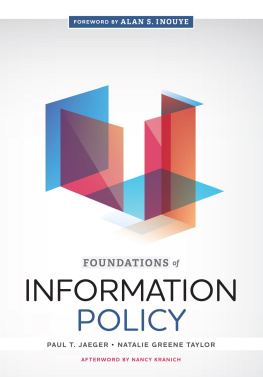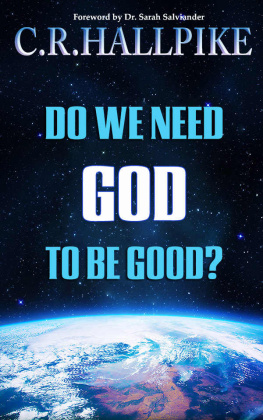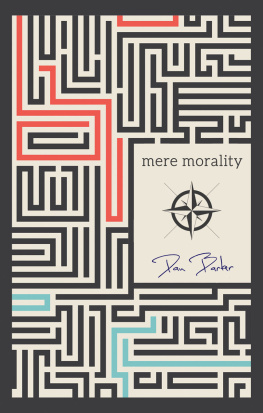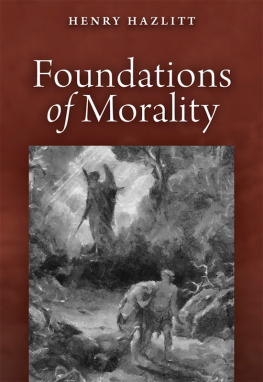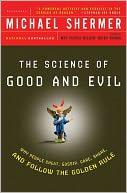Paul Nedelisky - Science and the good : the tragic quest for the foundations of morality
Here you can read online Paul Nedelisky - Science and the good : the tragic quest for the foundations of morality full text of the book (entire story) in english for free. Download pdf and epub, get meaning, cover and reviews about this ebook. year: 2018, publisher: Yale University Press, genre: Religion. Description of the work, (preface) as well as reviews are available. Best literature library LitArk.com created for fans of good reading and offers a wide selection of genres:
Romance novel
Science fiction
Adventure
Detective
Science
History
Home and family
Prose
Art
Politics
Computer
Non-fiction
Religion
Business
Children
Humor
Choose a favorite category and find really read worthwhile books. Enjoy immersion in the world of imagination, feel the emotions of the characters or learn something new for yourself, make an fascinating discovery.
- Book:Science and the good : the tragic quest for the foundations of morality
- Author:
- Publisher:Yale University Press
- Genre:
- Year:2018
- Rating:3 / 5
- Favourites:Add to favourites
- Your mark:
- 60
- 1
- 2
- 3
- 4
- 5
Science and the good : the tragic quest for the foundations of morality: summary, description and annotation
We offer to read an annotation, description, summary or preface (depends on what the author of the book "Science and the good : the tragic quest for the foundations of morality" wrote himself). If you haven't found the necessary information about the book — write in the comments, we will try to find it.
Paul Nedelisky: author's other books
Who wrote Science and the good : the tragic quest for the foundations of morality? Find out the surname, the name of the author of the book and a list of all author's works by series.
Science and the good : the tragic quest for the foundations of morality — read online for free the complete book (whole text) full work
Below is the text of the book, divided by pages. System saving the place of the last page read, allows you to conveniently read the book "Science and the good : the tragic quest for the foundations of morality" online for free, without having to search again every time where you left off. Put a bookmark, and you can go to the page where you finished reading at any time.
Font size:
Interval:
Bookmark:

Copyright 2018 by James Davison Hunter and Paul Nedelisky
All rights reserved.
This book may not be reproduced, in whole or in part, including illustrations, in any form (beyond that copying permitted by Sections 107 and 108 of the U.S. Copyright Law and except by reviewers for the public press), without written permission from the publishers.
Yale University Press books may be purchased in quantity for educational, business, or promotional use. For information, please e-mail sales.press@yale.edu (U.S. office) or sales@yaleup.co.uk (U.K. office).
Designed and set in Hoefler Text by Gopa & Ted2, Inc.
Printed in the United States of America.
Library of Congress Control Number: 2018947847
ISBN 978-0-300-19628-3 (hardcover : alk. paper)
eISBN 978-0-300-24040-5
A catalogue record for this book is available from the British Library.
This paper meets the requirements of ANSI/NISO Z39.48-1992
(Permanence of Paper).
10 9 8 7 6 5 4 3 2 1
Science and the Good
The Tragic Quest for the Foundations
of Morality

James Davison Hunter
Paul Nedelisky

FOUNDATIONAL QUESTIONS IN SCIENCE
At its deepest level, science becomes nearly indistinguishable from philosophy. The most fundamental scientific questions address the ultimate nature of the world. Foundational Questions in Science, jointly published by Templeton Press and Yale University Press, invites prominent scientists to ask these questions, describe our current best approaches to the answers, and tell us where such answers may lead: the new realities they point to and the further questions they compel us to ask. Intended for interested lay readers, students, and young scientists, these short volumes show how science approaches the mysteries of the world around us and offer readers a chance to explore the implications at the profoundest and most exciting levels.
CHAPTER
Our Promethean Longing
C AN SCIENCE be the foundation of morality?
The social implications of this question are enormous. We live in a time rife with disagreement, conflict, and violenceclashes that are almost always rooted in competing conceptions of the good. How, then, do we resolve such disagreements? Is there a way to arbitrate these disputes? Surely in a day of cosmopolitan sophistication, there must be some way to mediate themsome compelling logic that could provide a common foundation for moral belief and commitment.
There are many for whom this question is absurd on the face of itwho say there is a prima facie case against science ever being the foundation for morality. Their quick dismissal ignores the fact that some of the brightest minds in science and philosophy are confident that science can be the foundation of morality. Indeed, public discourse is awash with books that claim this very thing. All of this suggests that we may be at the start of a new age in which science provides clarity and insight into vexing moral questions.
The skeptics quick dismissal also ignores how centraland passionatethe quest for such a foundation has been to Western thought over the last four hundred years. Over centuries, the pursuit has been nothing if not ardent.
The question, then, matters, and it matters a great deal. But why?
THE DILEMMA OF DIFFERENCE
When one looks at this history carefully, one can see that, from the beginning, the animating force behind the quest for a scientific foundation for morality has been the desire to address the problems of moral difference and complexity and, more to the point, the conflict and confusion they generate. Many, to be sure, are also motivated by a pure search for truth. But even the search for truth is always embedded in a time and place and is strongly influenced by the contingencies of history and culture. Those contingencies always point to the overriding concern with the problem of difference.
The quest maps roughly onto the story of modernity. That story is, among other things, a story of the shrinking of the world in ways that bring in closer proximity different cultures and different ways of life. While the plurality of cultural difference has always existed, the past half millennia has amplified that development in ways that previous generations could not have imagined. The problem is that the coexistence of cultures is always accompanied by competing claims on shared public space, contradictory interests, and the inequities of power and privilege. Precisely because difference nearly always plays out at fundamental levels of human belief, and because the conflicts matter so concretely in human experience, they are nearly always accompanied by suspicion, tension, the suppression of legitimate claims and interests, latent antagonism, and sometimes open conflict and violence. The accumulated costs of these differences are beyond comprehension.
In the early decades of the twenty-first century, those differences are intensified to the point that we would say that the now globally interconnected world is constituted by these deep social, cultural, and political differences. As is plain to see, these differences are anything but abstractions but rather continue to bear on issues fundamental to the well-being of all human beingsorder, security, freedom, fairness, health, and wholeness. Is there an issue of public policy or foreign policy that is not morally fraught? Immigration, health care, racial inequality, care for the elderly and for the poor, education, aid to victims of natural disaster, international trade, and war are all laced with difficult moral questions that have no easy answers and that more often than not lead us to fundamental disagreements over what is right and wrong, good and evil, just and unjust. And underneath the many specific questions are more fundamental disagreements about what constitutes the good life, the good society, and the good world.
No ones motives are entirely pure. All of us operate with, at best, mixed and conflicting intentions. Yet most antagonists have been and are sincere in their desire for human flourishing, at least on their terms. Whatever else may motivate them, they also happen to disagree fundamentally and mostly sincerely on what is true, right, and good. Here, too, the costs of these disagreements are often beyond reckoning.
THE PROBLEM OF COMPLEXITY
The dilemma of difference is only made more confounding by the sheer complexity of the modern and now late modern world. At that time, this represented an extraordinary growth in the worlds knowledge. Five hundred years later, of course, the growth in information and knowledge has surged exponentially.
We now live in an age of information superabundance. It is often noted that more information has been produced in the last thirty years than in the previous five thousand. Around 1,000 books are published internationally every day, and the total of all printed knowledge doubles every five years.
We are overcome by a tsunami of information. Is there clarity, wisdom, or truth to be had in the midst of this complexity? If so, how do we sort through it all? The puzzles posed by difference and complexity are built into the modern world. Given the conflict, disorder, confusion, and human suffering that follow in the wake of our deepest differences, and given the massive complexity of modern knowledge and information, questions arise: What is Justice? Fairness? Equity? How do we live together at peace with our deepest moral differences? And if we cant agree on shared principles or ideals and their application, on what grounds do we adjudicate our disagreements?
Next pageFont size:
Interval:
Bookmark:
Similar books «Science and the good : the tragic quest for the foundations of morality»
Look at similar books to Science and the good : the tragic quest for the foundations of morality. We have selected literature similar in name and meaning in the hope of providing readers with more options to find new, interesting, not yet read works.
Discussion, reviews of the book Science and the good : the tragic quest for the foundations of morality and just readers' own opinions. Leave your comments, write what you think about the work, its meaning or the main characters. Specify what exactly you liked and what you didn't like, and why you think so.

